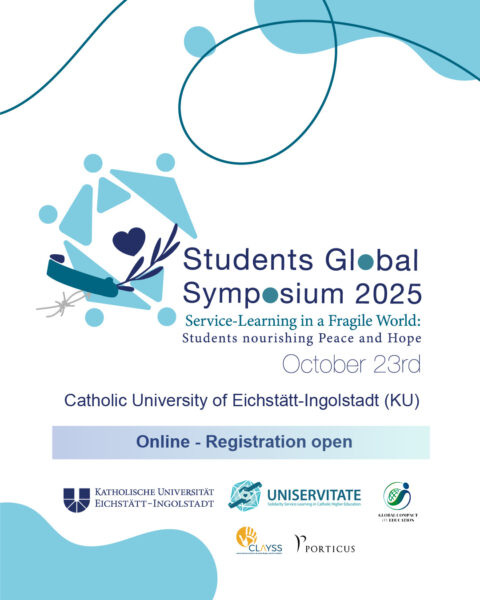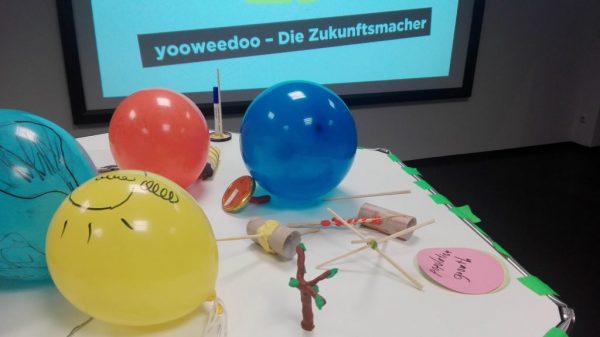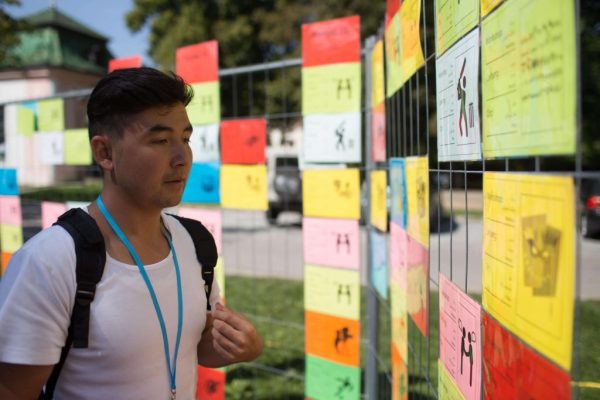Meetings that Interweave Solidarity with Service and Education

The 22nd International Solidarity Service-Learning Week, hosted by CLAYSS from 19th to 23rd August, brought together representatives from educational institutions in 24 countries worldwide in Buenos Aires. Many of them are already implementing projects based on the premise of learning to serve and serving to learn.
The longstanding event organized by the Latin American Center for Service-Learning (CLAYSS) included several events held in partnership with various institutions. For instance, the 28th International Solidarity Service-Learning Conference was held on 21st and 22nd August at the Universidad Católica Argentina (UCA) premises; the VII Researchers’ Symposium (JIAS) was held on Wednesday 20th at the Faculty of Dentistry of the University of Buenos Aires (UBA); then, a meeting with members of the Uniservitate programme, CLAYSS and Porticus, held on Tuesday 19th at the Universidad del Salvador (USAL); and finally, a meeting of the Ibero-American Service-Learning Network (REDIBAS), also held on Tuesday at the Palacio Pizzurno of the Secretariat for Education in Argentina.
At the end of the week, Nieves Tapia, founder and director of CLAYSS, said that her greatest joy was seeing that “there is a new generation to pass the solidarity torch; educators who were once students themselves are now replicating in their schools what they experienced as young people.” She added, “There is a big difference between people who have illusions and people who know hope. We know hope and can account for it; we can provide evidence of the trees we plant, the communities we serve, and the results of our projects. We know that we are creating hope in the present and not just for the future, and that if the world is not completely fallen apart today, it is because there are people in every corner of the planet who are keeping the torch and the soul of a society that can and should be less unfair and more supportive of each other.”

Nieves Tapia, Carlos Torrendel a and Jorge San Martín at the opening of the Solidarity Service-Learning Conference organised by CLAYSS
At the opening of the 28th International Solidarity Service-Learning Conference, Carlos Torrendel, Secretary of Education in Argentina, participated and addressed Tapia, because “Thanks to her, we could say that SSL has become a state policy in Argentina, something that many of us have managed to preserve and foster.” For him, the SSL is “a model” of what every pedagogical experience should be, given that “it isn’t a methodology but the display of a different anthropological approach that enables us to think about ways to create a true, full, and engaged education where educators are no longer mere part of a framework but become protagonists of a remarkable experience that affects them and those who learn with them.”
Similarly, Jorge San Martín, president of CLAYSS, also said at the opening ceremony of the Conference that the best way to learn is when students see that what they study can be useful to the lives of others. “Students who have this experience will surely be attentive to the needs of others” and form “a chain of solidarity and service that can change the reality around them and have a positive impact on people,” he said.
Many speakers underlined the transformative potential of solidarity service-learning, such as Miquel Martínez, professor of Pedagogy at the Universidad de Barcelona, Spain, and a member of the Uniservitate Academic Sounding Board. He stated that the SSL is now an educational paradigm that can be a leading factor in change within educational institutions and that in recent years, service-learning “has enabled us to move from value education in stimulation mode to value education in action mode.”

Nieves Tapia, Miquel Martínez and Ezequiel Gómez Caride at the plenary: “Critical Thinking and Citizenship: Solidarity Service-Learning in Challenging Times.”
The Conference was organized by CLAYSS with the support of AXION Energy, GivePulse, TICMAS, and Universidad Católica Argentina (UCA), and was declared of Educational Interest by the Secretariat for Education of the Ministry of Human Capital in Argentina (Resolution No. 2025-1182-APN-SE#MCH). Over five hundred educators, researchers, students from all educational levels, and representatives from social organizations took part. In addition to attendees from various Argentinian provinces, there were delegations from Catholic higher education institutions that are part of the Uniservitate global network from the following countries: Germany, Australia, Belgium, Brazil, Cameroon, Canada, Chile, Colombia, Congo, Ecuador, the United States, Spain, the Philippines, India, Kenya, Malawi, Mexico, Peru, Poland, Portugal, South Africa, and Ukraine. Rosita D’Angelo, an advocate for Service-Learning in Uruguay, described the audience as “a solidarity hub”. In her presentation, D’Angelo asked everyone present in the UCA’s San Agustín Hall to “enjoy sitting next to solidarity men and women in a place that interweaves solidarity together, which isn’t so easy to find these days.”
Effect on Giver and Receiver
During the week’s discussions and workshops, evidence was shared about the positive effect of solidarity service-learning, both for those who benefit from these initiatives and those who carry them out. “When I found out about the project, I felt the same sudden joy and excitement I get when the Argentinian national football team scores a goal,” said a young visually impaired man who is a member of the Council for People with Disabilities in Villa Regina, Río Negro province. He said this to students from the Technical Education Centre No. 18 in that town when they told him they planned to install Braille signs on the city’s streets and in public spaces. “The fact that young people are thinking about us moves me greatly and fills me with joy, because we’re always the ones knocking on doors, but this time, they came to us to bring solutions,” he added, as José Alberto Caro, a teacher at the technical school, recalled.
“It was the first time I didn’t see myself as a prisoner but as a person,” said an inmate at a maximum-security prison in Kenya, Africa, after a service-learning initiative. Judith Pete, a professor at Tangaza University in Nairobi, shared the inmates’ comments during a workshop on service-learning in contexts of incarceration. “For us, this is the heart of service-learning and the starting point for integral human development,” Pete added.
Luisa Mota Ribeiro, from the Universidade Católica Portuguesa, reported during the Researchers’ Symposium that one of the studies on the effect of solidarity service-learning found that 70% of students from different academic disciplines, out of a total of about two hundred, said that their life purpose had changed significantly, greatly, or completely after participating in these practices. “This finding makes us think that the students are having very meaningful experiences in their lives; they are connecting with people in vulnerable situations, which are new and very impactful situations for them,” she said.
Multiple Roles and a Variety of Voices

VII Researcher’s Symposium (JIAS) at the Faculty of Dentistry of the University of Buenos Aires (UBA)
During the Researcher’s Symposium (JIAS), 40 research projects were presented, selected by SSL specialists from those submitted from different regions of the world. As usual, CLAYSS will publish these works digitally to ensure free access for anyone interested in learning about new initiatives or being inspired by them. Meanwhile, the e-posters that were presented are already available.
The meeting of the Ibero-American Service-Learning Network (REDIBAS), celebrating two decades since its creation this year, welcomed participants from all educational levels and social organizations. They are part of networks in Argentina, Chile, Colombia, Spain, the United States, Mexico, Paraguay, Peru, Portugal, Uruguay, and Venezuela, alongside representatives from the Marist SSL Network. They shared experiences and presented the milestones that have marked REDIBAS’s activity over the past 20 years.
The voices of young people participating in SSL experiences were heard at the conference, during the traditional solidarity youth meeting, which this time brought together 56 secondary-school students from the cities of Buenos Aires and Córdoba, as well as from Poland, Uganda, and Germany. A group of students presented their conclusions to the 500 conference participants, where they asked to school authorities to be listened to and to expand the possibilities of developing solidarity service-learning experiences in their schools.
In the Spirit of Pope Francis
The spirit of the former archbishop of the Archdiocese of Buenos Aires imbued the day of the International Service-Learning Week dedicated to the meeting of the members of the Uniservitate Global Network. For that day, the Universidad del Salvador (USAL), where Jorge Mario Bergoglio worked, offered activities they had been planning for a while: to incorporate a ‘Pope Francis Tour’ around the emblematic places in Bergoglio’s life into the ‘Buenos Aires Historical Tours’ that the university already offers through their students of Tourism and other degrees.

One of the stops on the tour during the meeting of the members of the Uniservitate Global Network, at the Basilica San José de Flores.
On the morning of Tuesday, 19th, Olivia Crespo and Karel Fraz, fourth-year Tourism students, guided by professor Martha Siri, led a tour that the foreign Uniservitate delegations took part in. “This is the home of His Holiness Francis, who taught us to work with our heads, hearts and hands, and that is what we do in all the SSL activities concerning Uniservitate,” said USAL’s Academic Vice-Rector, Romina Cavalli, at the USAL Faculty of Medicine. In the afternoon, other students presented four initiatives carried out as part of the University Social Responsibility department in Buenos Aires and Corrientes provinces.
To finish the meeting with representatives from Catholic Universities, there was a Mass in the century-old Church of El Salvador presided over by Father Juan José Milano, alongside the rector of that church, Salvador Verón, and five priests belonging to the Uniservitate delegations: Dennis Etriga, Victor Mbuthia, and Stephano Kamwaza from Africa, and Wojciech Surmiak and Dawid Ledwon from Poland.
At the closing speech of this extensive service-learning week, Nieves Tapia referred to the countries that are going through armed conflicts, “where injustice tears our societies apart.” She also underlined the service-learning experience at the University of Bethlehem, which was presented at the Service-Learning Researchers’ Symposium via a video, since the professors were not authorized to leave Palestine and travel to Argentina. Despite the conflicts, Tapia invited the audience to “dedicate ourselves to making the power of hope grow, which is what the world needs most.”
The following links will take you to the recordings published on our YouTube channel:


































